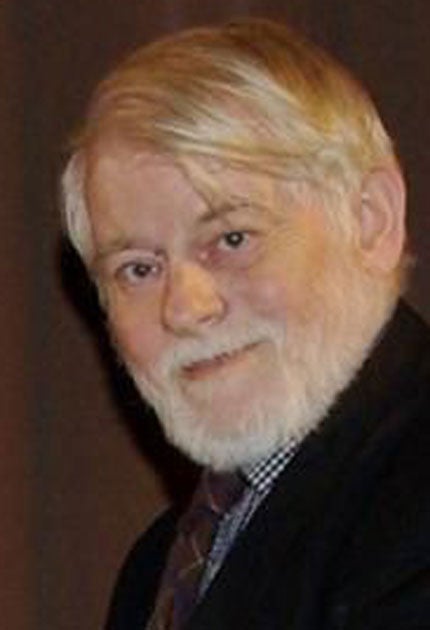Griffith Vaughan Williams: Champion of gay rights who fought institutional homophobia

Your support helps us to tell the story
From reproductive rights to climate change to Big Tech, The Independent is on the ground when the story is developing. Whether it's investigating the financials of Elon Musk's pro-Trump PAC or producing our latest documentary, 'The A Word', which shines a light on the American women fighting for reproductive rights, we know how important it is to parse out the facts from the messaging.
At such a critical moment in US history, we need reporters on the ground. Your donation allows us to keep sending journalists to speak to both sides of the story.
The Independent is trusted by Americans across the entire political spectrum. And unlike many other quality news outlets, we choose not to lock Americans out of our reporting and analysis with paywalls. We believe quality journalism should be available to everyone, paid for by those who can afford it.
Your support makes all the difference.Griffith Vaughan Williams was a passionate advocate for the rights of lesbian, gay, bisexual and transgendered (LGBT) people. He was described by the historian Keith Howes as "passionately, noisily committed to gay rights but never pompous or elitist; always politely eloquent, even at his most bombastic. His was a powerful gay voice, devoted to truth and equality." Determined to uncover and expose the extent of violence against homosexuals, he worked often with the police and his robust, in-your-face, thorough questioning of police practices led to much improved relations between the Metropolitan police and the gay community.
Griff, as his friends knew him, was born in Bangor, North Wales in 1940 and educated at a local grammar school. In Cardiff he trained as a journalist and worked for a number of magazines and provincial newspapers around the country, and in the press office at the Institute of Mechanical Engineers. He then became a freelance journalist.
Griff's involvement in gay rights work began in 1964, three yearsbefore the Sexual Offences Act partially decriminalised sexual acts between men, and he was a leading memberof the Campaign for Homosexual Equality (CHE) from its earliest days. In 1974 Griff (above) was one of the members who agreed to consult on and participate in London Weekend Television's pioneering documentary about homosexual equality called Speak for Yourself.
In 1980, Griff contributed to the research that led to CHE's publication of Attacks on Gay People by Julian Meldrum. This modest but ground-breaking pamphlet helped to expose an alarmingly high number of cases of homophobic violence and abuse in Britain, some of them perpetrated by police officers. Griff was one a of a small group of lesbian and gay activists who approached the Metropolitan Police in the early 1990s with the purpose of working in partnership with them on policing operations and methods which impacted primarily on gay men. The London Lesbian and Gay Police Initiative (LLGPI) met regularly with the Met throughout the 1990s.
In June 1999 Griff was one of a group of LGBT representatives called into New Scotland Yard for emergency meetings in the aftermath of the Admiral Duncan pub bombing. With others he advised the Met on the impact of the bombing on the LGBT community in London while the perpetrator, David Copeland, was still at large. Following the bombing in Soho, the Met decided it needed to extend its links with the LGBT communities with the formation of the LGBT Advisory Group.
Griff was one of the original members of the LGBT Advisory Group and continued to be an active member until two weeks before his death. He was particularly involved with critical incidents, mainly murders. In 2007 the LGBT Advisory Group claimed in a report that police detectives investigating murders of and violent crimes against gay men were influenced by institutional homophobia. Their LGBT Murder Review exposed the many investigations between 1990 and 2002 that were marred by lack of knowledge, reliance on gay stereotypes, and prejudice by the police.
The 22 recommendations for improvement were implemented by the Met. Following the publication of the report, the Met awarded Commendations to Griff and his colleagues.
Bob Hodgson, the co-chair of the Met's LGBT Advisory Group, remembers Griff as "a character, and a gay activist who had an encyclopaedic knowledge of LGBT issues and details of past and current cases. He scoured local papers and visited coroner's courts to discover pieces of information on LGBT cases which had been overlooked or badly investigated.
He was well known at many LGBT forums across London. To Chairs like myself he could be challenging in the extreme. If he thought an issue had been brushed aside he would persist with specific questions until satisfied with the answer.
He was also a stickler for meeting protocols and doggedly refused to embrace electronic communication technology. At the ends of meetings his lists of items under 'any other business' were legendary but he delivered them with good humour and a characteristic twinkle in his eye."
Griffith Vaughan Williams, journalist and gay activist: born Bangor, North Wales 9 November 1940; died London 15 November 2010.
Join our commenting forum
Join thought-provoking conversations, follow other Independent readers and see their replies
Comments